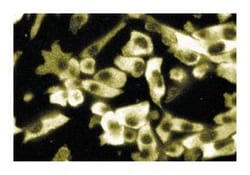Learn More
NMT-2 Mouse anti-Human, Unlabeled, Clone: 30, BD
Mouse Monoclonal Antibody
Supplier: BD Biosciences 611310
Description
Myristoylation is an essential cotranslational modification for many mammalian, viral, and fungal signaling proteins. N-terminal myristoylation is a lipid modification that is catalyzed by N-myristoyltransferase (NMT). NMT transfers myristic acid from myristoyl coenzyme A to the amino group of a protein's N-terminal glycine residue. This modification is important for localization and/or function of many of these proteins. Two human NMTs (NMT-1, NMT-2) have been identified. These proteins share 95% amino acid identity with their mouse homologs. NMT-1 is processed to form four protein isoforms with molecular weights ranging from 49-68kDa. It is not known if these four isoforms are derived from single or multiple gene(s) and their exact functional roles are yet to be determined. In contrast to NMT-1, NMT-2 is a single 65kDa protein. It contains 77% sequence identity with NMT-1, indicating that these proteins comprise two distinct families with overlapping, but distinct, substrate preferences. Additionally, NMT enzymatic activity is increased in colorectal tumors. Thus, NMTs are transferases whose function is essential for biological function of a variety of signaling proteins.
Host Species: Mouse
Clone: 30
Isotype: IgG1
Species Reactivity: Human
Immunogen: Human NMT-2 aa. 10-119
Formula Weight [Chemical]: 65kDa
Immunofluorescence, Western Blotting

Specifications
| NMT-2 | |
| Monoclonal | |
| 250μg/mL | |
| Aqueous buffered solution containing BSA, glycerol, and ≤0.09% sodium azide. | |
| Human NMT-2 aa. 10-119 | |
| 50 μg | |
| Cell Biology | |
| Human | |
| IgG1 |
| Western Blot | |
| 30 | |
| Unconjugated | |
| Mouse | |
| Affinity Purified | |
| RUO | |
| Primary | |
| Store undiluted at -20°C. |
Your input is important to us. Please complete this form to provide feedback related to the content on this product.

